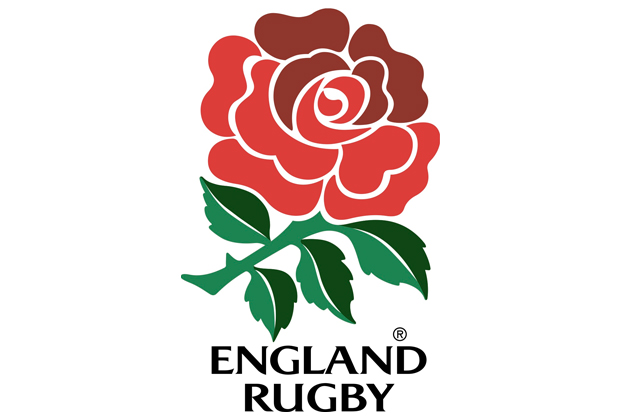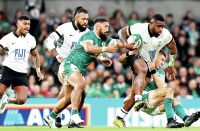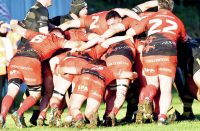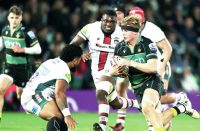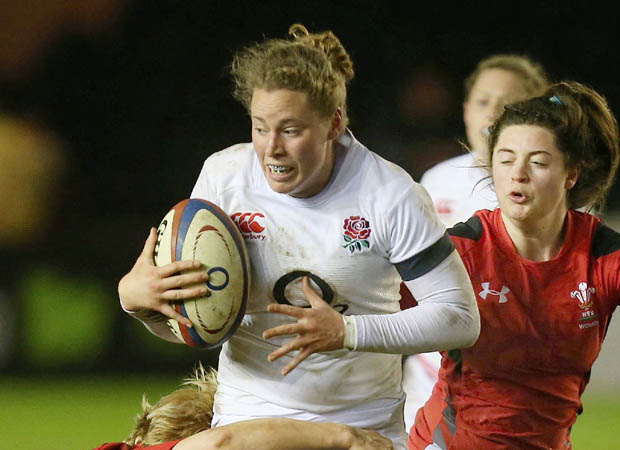 A hard core of determined World Cup veterans may lay at the heart of England‘s World Cup squad but equally it will need fearless younger players like Amber Reed to fully blossom if they are to win their first World crown for 20 years when they contest the World Cup in Paris next month.
A hard core of determined World Cup veterans may lay at the heart of England‘s World Cup squad but equally it will need fearless younger players like Amber Reed to fully blossom if they are to win their first World crown for 20 years when they contest the World Cup in Paris next month.
Maggie Alphonsi, Rachael Burford, Tamara Taylor, Danielle Waterman and Rochelle Clark have all contested two World Cup finals in the last eight years – both against New Zealand – but have fallen agonisingly short.
That quintet ‘go’ again in Marcoussis next month but England coach Gary Street will be hoping the athleticism and X-factor of players like Reed can make the difference in the seemingly endless quest to overcome New Zealand, who have won every World Cup since England took the 1994 title in Edinburgh. Throughout those two decades they nearest they have come to defeat was four year ago when England went down 13-10 in the final.
Reed is a strapping 5ft 11in, 12st-plus centre – quick and strong on the break and with good all round skills and vision – who has made a big impact since being drafted into the team in the autumn of 2012.
A Cornishwoman and proud of it – her uncle is former Cornwall, Scotland and Lions lock Andy Reed – she is the latest in a long line of sports science graduates from Exeter University (once known as St Luke’s College), which over the decades has supplied a steady supply of talent for England’s senior men’s team.
A former captain down at Exeter, Reed was voted the BUCS female athlete of the year for 2012-13 after leading Exeter to the BUCS Championship and breaking into the England team and helping them to a 3-0 home series victory over New Zealand. Now helping out on the sports side at Bloxham School before completing her teacher training next year, Reed also plays elite level rugby for Bristol.
“New Zealand do have a bit of an aura, like the All Blacks, and you can’t argue with their record in the last four World Cups but we can match them,” insists Reed. “We have enjoyed success against them away from the World Cup and are fitter and better prepared than ever before. This is a real opportunity for us.
“We have been working really hard in camp and achieving new fitness levels and what that does more than anything is enable you to perform under fatigue which I think is what has set New Zealand teams apart over the years. They have the ability to be clinical in the 79th minute when something needs doing. That is something we aspire to and I believe we are getting there.
“Personally I have never been so fit and strong and you get a real surge of confidence when you feel like that. This summer I have felt and seen the improvements week on week and then you look around and see all your colleagues doing exactly the same and that gives you great confidence as well.
“I’ve loved it in camp this summer. I only graduated from Exeter last summer so the campus-type environment is very familiar to me. I’m used to devoting lengthy periods of time to sport and training and I very much enjoy the sports science side of things which backs it up. The mechanics of it all is fascinating; it’s what I did my degree in, basically.
“I like to understand what we are doing and why we are doing it and to testing how I react to different environments and exercise. There had definitely been a little element of ‘living the dream’ down at Surrey Sports Park but ultimately it’s all an end to a means. What we have to do now is go out to France and execute and perform. We need to do ourselves justice and reap the benefits of all this hard work.”
England have another two weeks in camp planned and that will include controlled warm-up matches against the USA before they travel to Marcoussis, the French Federation’s national training centre in the southern suburbs of Paris where all the pool games will be staged. The knock-out stages and final will be at Stade Francais‘ splendidly refurbished Stade Jean Bouin.
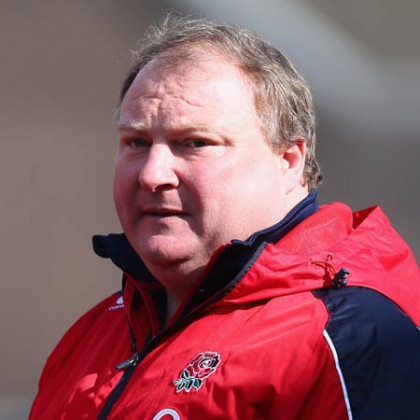 “It’s the strongest 26 we’ve had in my career with England,” says coach Gary Street. “It’s a good balance with five players going to their third World Cup but we also have fresh players hungry for their first World Cup experience. We also have the likes of young Alex Matthews who has nine caps, six of them in wins against New Zealand. Injuries have stalled her progression over the last 12 months but she has come back well in international sevens and we are excited by what she’ll bring.
“It’s the strongest 26 we’ve had in my career with England,” says coach Gary Street. “It’s a good balance with five players going to their third World Cup but we also have fresh players hungry for their first World Cup experience. We also have the likes of young Alex Matthews who has nine caps, six of them in wins against New Zealand. Injuries have stalled her progression over the last 12 months but she has come back well in international sevens and we are excited by what she’ll bring.
“It’s all becoming a bit more real now. The selection process was dreadfully difficult – one of the toughest decisions I’ve had to make. We’ve had 32 players in camp now for an extended period of time and, although we’re convinced that we are going with the right ones, we’ve had to leave six talented players behind. I just feel for them.
“We now have a couple more weeks of camp time before we leave for France and we’ll use this time to look to raise the bar even higher and fine tune the details ready for kick-off against Samoa.”
“I don’t think I’ve ever got over that 13-10 loss in the final four years ago. The first three months afterwards were very hard because we didn’t really do ourselves justice in that final. It was a big motivation for us to go one better and now the chance is upon us. Some of the girls have been in two World Cup finals and lost them both – with that in mind, I think we’ll be the side that wants it most.”
*This article was published in The Rugby Paper on 13 July
